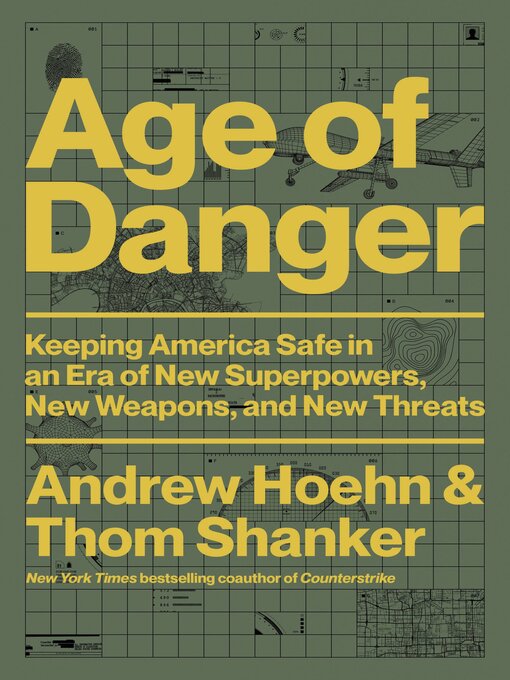Age of Danger
Keeping America Safe in an Era of New Superpowers, New Weapons, and New Threats
Again and again, American taxpayers are asked to open their wallets and pay for a national security machine that costs $1 trillion operate. Yet time and time again, the US government gets it wrong on critical issues. So what can be done? Enter bestselling author Thom Shanker and defense expert Andrew Hoehn. With decades of national security expertise between them and access to virtually every expert, they look at what’s going wrong in national security and how to make it go right.
Age of Danger looks at the major challenges facing America—from superpowers like Russia and China to emerging threats like pandemics, cybersecurity, climate change, and drones—and reimagines the national security apparatus into something that can truly keep Americans safe. Weaving together expert analysis with exclusive interviews from a new generation of national security leaders, Shanker and Hoehn argue that the United States must create an industrial-grade, life-saving machine out of a system that, for too long, was focused only on deterring adversaries and carrying out global military operations. It is a timely and crucial call to action—a call that if heeded, could save Americans lives, money, and our very future on the global stage.
-
Creators
-
Publisher
-
Release date
May 9, 2023 -
Formats
-
Kindle Book
-
OverDrive Read
- ISBN: 9780306829123
-
EPUB ebook
- ISBN: 9780306829123
- File size: 1767 KB
-
-
Languages
- English
-
Reviews
-
Publisher's Weekly
February 27, 2023
What do American taxpayers actually get for the $1.25 trillion they spend per year on national security? RAND Corporation senior v-p Hoehn and Shanker (coauthor, Counterstrike), director of the Project for Media and National Security, examine in this astute survey how government and military leaders have responded to threats ranging from Russia and China to Covid-19 and climate change. Dividing America’s “national security apparatus” into the “warning machine” (intelligence officials who “gather, assess, and curate information from around the world”) and the “action machine” (“a large and expensive set of systems, from the FBI and Homeland Security to the military, charged with taking the actions to keep our country safe”), the authors argue that an overcorrection after 9/11 to focus almost exclusively on terrorism has contributed to America’s failure to anticipate or respond effectively to “the nonstop Chinese theft of U.S. intellectual property,” Russian cyberattacks, and other dangers. Hoehn and Shanker contend that “the future needs a seat at the table” if the national security system is to learn from such costly mistakes, but the library of unheeded intelligence reports they bring to light raises questions about prioritization, communication, and procedure that aren’t fully resolved. Still, this is a knowledgeable and convincing tour of where and how America’s safeguards should be strengthened. -
Kirkus
April 1, 2023
A detailed examination of the flawed U.S. national security apparatus, which costs more than $1 trillion per year to operate. Hoehn, research director at the RAND Corporation, and Shanker, the director of the Project for Media and National Security, bring great expertise to their subject, knowledge they bolster with further wisdom from a small army of Beltway experts and former officials. Despite massive expenditures, the last few presidential administrations have often been stunned by events at home and abroad. The authors divide the system into "the warning machine," aimed at identifying emerging threats, and "the action machine," tasked with dealing with those threats. Much of the problem is that these two parts have different mindsets, and debate often degenerates into interagency conflict. A related issue is that the national security agencies were initially designed for the Cold War environment, and they have been slow to adapt to a nonbipolar world. After 9/11, the pendulum swung toward terrorism. As that threat receded, China emerged as the central security concern. Hoehn and Shanker identify a parade of new-generation threats, from cyberwarfare to climate change to biological attacks on the food supply. But therein lies the problem: There are so many things to worry about that information overload is a systemic danger. The authors are clearly aware of the many pitfalls involved, and they propose the creation of a series of standing joint task forces to work across agencies. It's a worthy idea but one that could lead to deeper layers of bureaucracy. Nevertheless, the authors' forceful message about the necessity of meaningful action is significant. "If recent decades have taught us anything," they write, "it is that the seemingly urgent has a way of displacing the quietly important. The immediate overshadows the pending. Not always, but often enough." An instructive deep dive into a system that requires vast improvement efforts.COPYRIGHT(2023) Kirkus Reviews, ALL RIGHTS RESERVED.
-
Formats
- Kindle Book
- OverDrive Read
- EPUB ebook
subjects
Languages
- English
Loading
Why is availability limited?
×Availability can change throughout the month based on the library's budget. You can still place a hold on the title, and your hold will be automatically filled as soon as the title is available again.
The Kindle Book format for this title is not supported on:
×Read-along ebook
×The OverDrive Read format of this ebook has professional narration that plays while you read in your browser. Learn more here.


